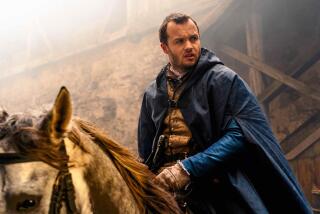New life for ‘Sherlock’ and Benedict Cumberbatch
Hang on to your deerstalker cap: Sherlock Holmes is not dead.
This news may come as a shock to some, not least to John Watson, the doctor played by Martin Freeman in “Sherlock,” the BBC’s contemporary adaptation of Sir Arthur Conan Doyle’s famous detective stories. The critically acclaimed show, with Benedict Cumberbatch as the title detective, returns to PBS on Sunday.
The new season picks up two years after the last one left off, with Holmes having faked his own death by supposedly leaping from St. Bartholomew’s Hospital. The revelation that the supremely self-assured crime-solver has been alive all along renews his sometimes-prickly relationship with Watson, his partner and perennial sidekick in solving London’s toughest cases.
FOR THE RECORD:
“Sherlock”: An article in the Jan. 18 Calendar section previewing the new season of the television show “Sherlock” misspelled the last name of the show’s creator Steven Moffat as Moffatt. —
Before firing off that tweet howling in protest for the spoiler, know that Holmes staged his own suicide in the original Doyle stories too, which have been around for more than a century — the first appeared in 1887 — and which form a loose basis for the show’s often freewheeling adaptations. (Also, this: Did you really think they’d bring back a Sherlock Holmes series without Holmes?)
WINTER TV PREVIEW: Full coverage of the season’s shows
“That’s a pretty huge shift in his life,” Freeman said of his character during a recent phone interview from Britain. “It hits him in the way it would hit any of us who find out that our best friend is not actually dead.”
Actually, quite a lot has happened since the last time we saw Holmes and Watson sleuthing their way through Mayfair and Marylebone.
The leads are now two of the busiest actors in Britain. Freeman — once best-known for his role as diffident paper salesman Tim Canterbury on the BBC’s “The Office” — has become an international star thanks to his title role in Peter Jackson’s blockbuster “Hobbit” films. Cumberbatch, meanwhile, played supporting roles in two of this year’s top Oscar contenders — he was a conflicted plantation owner in “12 Years a Slave” and a heartsick Oklahoma bachelor in “August: Osage County.” But he couldn’t totally leave Freeman alone even when they were away from “Sherlock”: He voiced Smaug, the menacing dragon in the “Hobbit” movies.
BEST TV OF 2013 Lloyd | McNamara
Steven Moffat, who co-created “Sherlock” with writing partner Mark Gatiss, has a hectic career himself, recently helping to oversee the landmark 50th anniversary special of the BBC sci-fi series “Doctor Who,” which shattered ratings records around the world. Moffat crammed in filming of the three 90-minute “Sherlock” episodes as he was mired in preparations for the “Doctor Who” special.
“I haven’t had a weekend off in a very, very long while,” Moffat said in a phone interview, quickly adding with a chuckle: “When I go on to my inevitable failures in the future, I will remember these as the days.”
Fans — and many reviewers — already number “Sherlock” as among the best-filmed Holmes adaptations ever. And that is no small feat as Holmes is one of the most commonly recurring cinematic characters, having been played by everyone from John Barrymore to Basil Rathbone to Robert Downey Jr. (Another Holmes-inspired TV update, “Elementary,” is in the middle of its second season on CBS.)
PHOTOS: Faces to watch 2014 | TV
Moffat and Gatiss wanted an irreverent, thoroughly modern take on the material while still using Doyle’s work as a jumping-off point. “We came up with this because we’re massive Sherlock Holmes geeks,” Moffat said. “One of the things we wanted to do with this show was to say, if you take away the false distance of a period piece, you will see how good these characters really are.”
As for Holmes purists? “The reason they forgive us so readily for the updating is that it’s so obvious we are fanboys.”
When first approached about the project, Freeman worried that it would be “hip and ironic and post-modern and all of that,” he said. “It wasn’t. It was the real deal. It was by people who loved the source material.”
PHOTOS: Celebrities by The Times
Key was finding a way to highlight the contradictions embedded inside some very familiar characters. Cumberbatch’s Sherlock projects both impish brilliance as well as often appalling social skills.
Freeman’s Watson suffers from post-traumatic stress because of his medical duty in war-torn Afghanistan, but he still has an eye for the ladies. He’s hardly just a second fiddle to Holmes; as Moffat — who said that, as a child, he read the entire Holmes canon in order of publication — is fond of pointing out, nearly all of the Doyle stories are narrated by Dr. Watson, who among other things serves as someone for the reader to identify with beyond the aloof detective.
As Freeman said, “I wanted to play the co-lead rather than someone who’s just in the background.”
Modern London is a character in the drama as well. Indeed, the show’s title card features a London skyline dominated by the Eye, the massive Ferris wheel on the Thames that has become a symbol of the city since its unveiling in 2000.
The first episode this season, “The Empty Hearse,” is loosely adapted from the 1903 story “The Adventure of the Empty House,” which Doyle published after finally relenting to popular demands that he bring back Holmes after killing him off 10 years before. “The Sign of Three,” the second episode, takes its inspiration from “The Sign of the Four,” the first Holmes novel. “His Last Vow,” which closes out the season, is based on “The Adventure of Charles Augustus Milverton.”
Three episodes makes for a scandalously brief TV season — especially by American standards — but, at 90 minutes, each episode is more like a feature than a TV episode.
“They’re high-quality films, made between four and five weeks per episode,” Freeman said. “When people say, ‘Why are there only three?’ I say, ‘We’re giving you three films!’ That’s a lot.”
And there will be more where those came from, fans can rest assured. Moffat admitted that between his schedule and those of his two leads, finding time to make “Sherlock” has proved difficult. But even if they don’t quite have a deal in place just yet, there will be more episodes, he promised.
“Really and truly, there will be more. It’s a bit of a no-brainer,” Moffat said. “The fact that we don’t have a signed piece of paper doesn’t mean anything. The BBC have been very clear that they want more.”
[For the record, 9:22 a.m. Jan. 18, 2014: In an earlier version of this post, Steven Moffat’s last name was misspelled as Moffatt.]
More to Read
The complete guide to home viewing
Get Screen Gab for everything about the TV shows and streaming movies everyone’s talking about.
You may occasionally receive promotional content from the Los Angeles Times.







